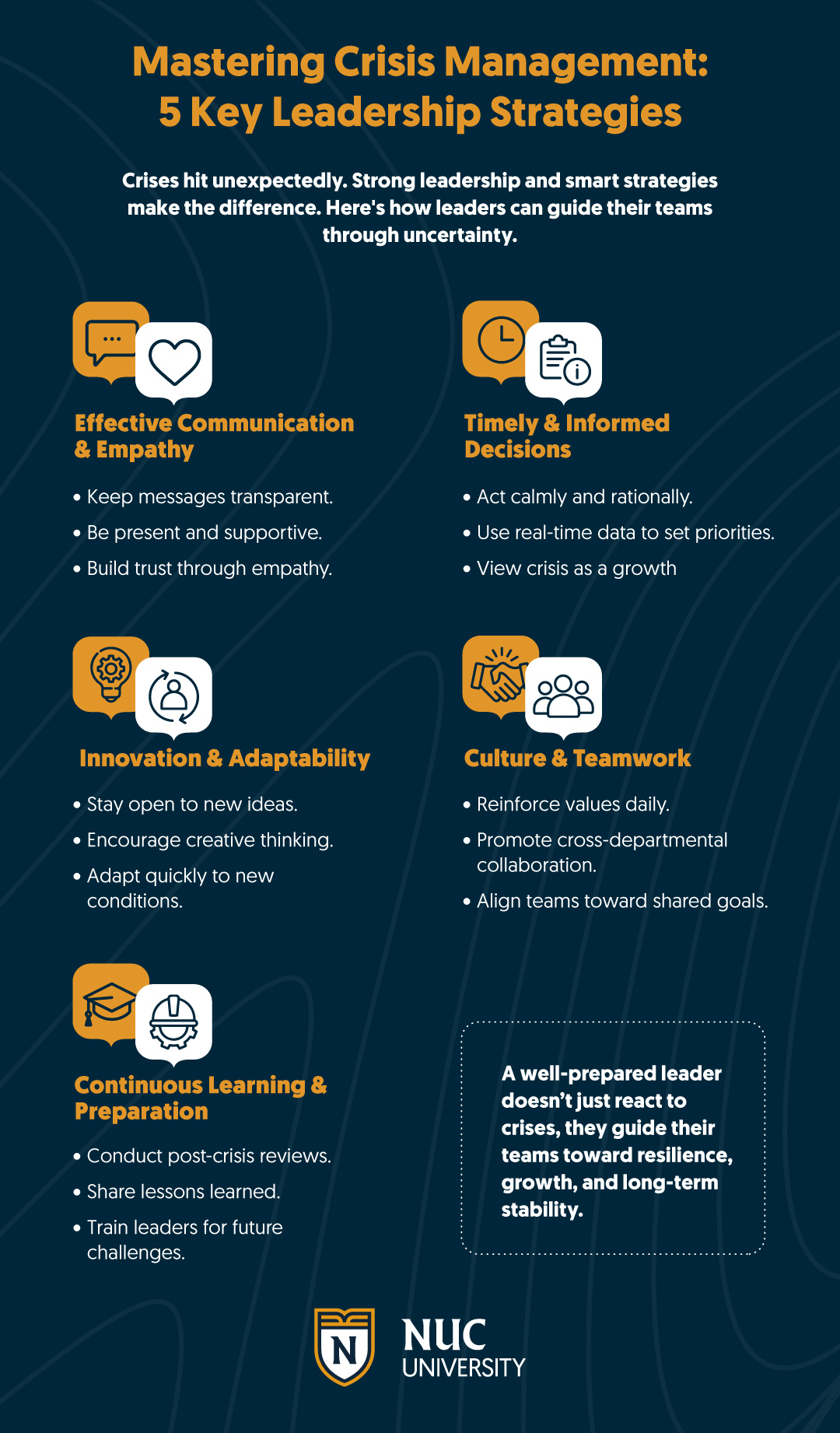Workplace crises strike without warning. Whether caused by internal or external factors, an organization’s ability to manage and overcome adversity depends heavily on strong leadership and proper preparation. For this reason, team managers must be prepared to make quick decisions, communicate effectively, and ensure stability during uncertain times.
Below, we explore key strategies for effective crisis management that help minimize negative effects and build team trust.
Effective Communication and Empathetic Leadership
Maintaining clear and transparent communication during a crisis is crucial to preserve trust among employees, clients, and stakeholders. A well-defined communication strategy allows leaders to share information effectively and foster a positive response in challenging situations.
Leaders must not only establish communication plans but also show empathy and support to their teams. Acknowledging and addressing employees’ emotional needs enhances motivation, engagement, cohesion, and productivity once the crisis has passed.
Empathetic leadership also involves being available to listen to concerns, provide clarity, and convey stability. Teams rely on strong leadership during crises, and the way messages are conveyed can significantly influence perceptions and reactions.
Timely and Informed Decision-Making
Making timely and well-informed decisions is essential in crisis situations. To achieve this, it is important to remain calm, avoid panic, and think rationally. Analyzing available data and identifying key priorities allows for a structured approach that protects essential resources and minimizes disruptions. Reports, trends, and simulations can help anticipate challenges while allowing the adjustment of strategies in real time.
Resilient leaders view the stress and challenges of a crisis as opportunities for growth, both for themselves and their teams.
Innovation and Adaptability
Crises often demand innovative solutions and the ability to adapt quickly. Leaders should stay open to new ideas and perspectives while encouraging their teams to think creatively and navigate obstacles. Adaptability is a fundamental trait that enables organizations to thrive in turbulent times.
The ability to adapt quickly to new circumstances can determine success or failure in crisis management. Hosting brainstorming sessions and fostering collaboration can lead to more effective solutions for unexpected challenges.
Organizational Culture and Teamwork
During challenging times, an organization’s values and culture are key elements that must be reinforced. A people-centered leadership approach helps maintain team cohesion and reinforces commitment. A clearly defined purpose keeps the organization on track and fosters a sense of belonging among employees. However, organizational culture must be cultivated daily so it can serve as a pillar during crises.
Collaboration across teams and departments is also critical, ensuring that everyone works toward a common goal. Promoting teamwork and forming strategic alliances within the company can provide valuable resources for tackling complex challenges.
Continuous Management Learning and Training
Once a crisis is resolved, organizations must analyze events and gather leadership feedback to identify areas for improvement and refine crisis management strategies. Conducting post-crisis reviews, documenting key lessons, and sharing them across teams ensure stronger preparedness for future challenges.
Additionally, investing in leadership training and crisis management programs is essential to preparing leaders for future challenges. Specialized programs and workshops equip leaders with the skills and tools needed to navigate adversity and maintain organizational stability effectively.

Sources:
Deloitte, ‘¿A qué afecta una crisis empresarial?’
https://www.deloitte.com/es/es/services/risk-advisory/services/gestion-de-crisis.html
Communicating in a Crisis: What, When, and How
https://www.ccl.org/articles/leading-effectively-articles/communicating-in-a-crisis-what-when-and-how/
How to Lead Through a Crisis
https://www.ccl.org/articles/leading-effectively-articles/how-to-lead-through-a-crisis/#:~:text=Effective%20leadership%20in%20crisis%20means,those%20actions%20truthfully%20and%20honestly.
How can you make your organizational culture more crisis-ready?
https://es.linkedin.com/advice/0/how-can-you-make-your-organizational-culture-womge?lang=en




